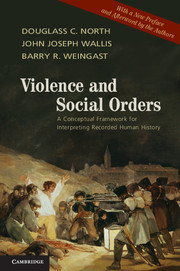Book contents
- Frontmatter
- Contents
- Preface
- Acknowledgments
- 1 The Conceptual Framework
- 2 The Natural State
- 3 The Natural State Applied: English Land Law
- 4 Open Access Orders
- 5 The Transition from Limited to Open Access Orders: The Doorstep Conditions
- 6 The Transition Proper
- 7 A New Research Agenda for the Social Sciences
- References
- Index
5 - The Transition from Limited to Open Access Orders: The Doorstep Conditions
Published online by Cambridge University Press: 17 August 2009
- Frontmatter
- Contents
- Preface
- Acknowledgments
- 1 The Conceptual Framework
- 2 The Natural State
- 3 The Natural State Applied: English Land Law
- 4 Open Access Orders
- 5 The Transition from Limited to Open Access Orders: The Doorstep Conditions
- 6 The Transition Proper
- 7 A New Research Agenda for the Social Sciences
- References
- Index
Summary
Introduction
Societies do not leap from limited to open access. Transitions occur in two steps where first the relations within the dominant coalition transform from personal to impersonal, and then those arrangements are extended to the larger population. The transition begins in a natural state, so the initial steps must be consistent with the logic of the natural state and personal relationships. Impersonal elite relationships can develop within the natural state by changing formal rules that transform elite privileges into rights. When a natural state develops institutions, organizations, and beliefs that allow elites to treat each other impersonally, then that society is on the doorstep. In the second step, the transition proper, societies on the doorstep continue to transform intra-elite relationships. Creating institutions that formally protect impersonal elite identities and elite access to organizations enables the extension of the same rights to a larger segment of the population. We treat the transition proper in the next chapter.
Our emphasis on personality and impersonality flows from the importance of developing impersonal exchange and relationships in human history. Personal elite identities are closely related to organizations, and the connection between personality and identity allows us to deal directly with formation of beliefs. Viewing the dynamics of social orders as shaped by the way in which organizations and institutions are structured, the consequent focus on the state as an organization and the dynamics of intra-elite relationships within the coalition now pays dividends.
- Type
- Chapter
- Information
- Violence and Social OrdersA Conceptual Framework for Interpreting Recorded Human History, pp. 148 - 189Publisher: Cambridge University PressPrint publication year: 2009



